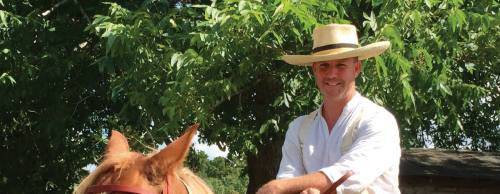Steve Baird’s lifelong interest in the past stems from a sense he was born of the wrong era.
“Growing up, I always read fantasy books along with historical fiction books,” he said. “I watched history shows and always had the feeling that I was born in the wrong century.”
Baird holds a degree in anthropology from Texas Tech University and his Master of Archaeology and Heritage Management from University of Leicester in the U.K. He moved to Houston in 2003.
“I had been working as an archaeologist, working for various firms across the state,” he said. “A company in Houston called me for a permanent job as the staff archaeologist. I stayed with that firm about two years before going back to get my teacher certification.”
The married father of four was passed over for the job of Klein historian at Wunderlich Farm in favor of LaNeel Allee, living history educator for the Klein, Texas Historical Foundation. In turn, Baird taught as a substitute teacher for a year at Klein ISD and was hired as a fourth-grade teacher at Mittelstadt Elementary School.
With his fourth graders, he visited Wunderlich Farm and volunteered as a docent.
During his visits, he sharpened his knowledge of the artifacts and history of the Wunderlich Farm and the museum and kept a keen eye on the procedures there in the hopes that the job would some day present itself again. In 2013 it did.
“When Mrs. Allee retired, I had another chance to apply for my dream job and got it,” he said.
A day in the life of Baird starts at 7:30 a.m., when he opens up the buildings for school tours. He feeds the livestock, milks the goats and trains parent volunteers for the tours. At around noon, he cleans up after the tours and prepares the museum for the next day’s tour. He spends the afternoons working on artifact preservation and then returns to the farm to feed the livestock and milk the goats again.
“Since its first tour back in 1998, the program has evolved to the point that it is a full- experience destination,” Baird said. “I see it as a living history park that now also provides fourth-grade field trips to not only Klein, but several other school districts as well as homeschool groups and private schools.”
He said last year 25,000 visitors came through the gates but with only 3,800 as fourth-grade tours, signaling a visitor interest that goes beyond the traditional field trips.
“Our motto is ‘Going Beyond History,’” he said. “We end up teaching animal science at the animal encounters, basic herb lore while cooking tea, crackers or even cheese. Visitors learn about gardening and what grows best and where. Our goal is that kids and parents both walk away and say how fun and educational their visit was.”
Baird eschews the method of rote memorization of facts when he teaches history.
“Too often I heard incoming fourth graders groan when I mentioned history, but by the end of the year, it was their favorite subject,” he said.
Baird’s dedication to history also stems from an awareness that a region needs to understand its roots to realize its identity.
“We have a history that involves a great migration from Germany,” he said. “The history of Klein gives us a glimpse into what was going on in Germany as well as the day- to-day life in an unsettled land. If we don’t get these histories and stories preserved now, then we run the risk of losing that valuable information.”




